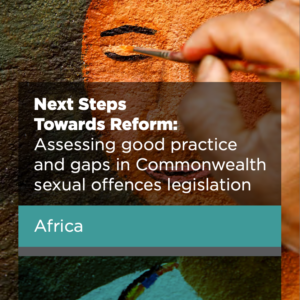Cameroon’s sexual offences laws are contained in the Penal Code 2016 (PC). The Penal Code was revised in 2016 and now contains some important provisions on violence against women and girls, such as offences of forced marriage and genital mutilation, and explicitly stating that a person accused of rape cannot escape prosecution and conviction by subsequently marrying the victim. While they may meet good practice for sexual offences law, they are not assessed in this research. Elements that do meet the good practice indicators include sexual assault crimes that are gender-neutral, the criminalisation of marital rape and sexual assault, not providing a defence of consent to child sexual assaults and not criminalising consensual sexual activity with a person with disability regardless of freely given consent.
However, in many other respects, the law does not meet the good practice indicators. For example, ‘rape’ is limited to penile penetration and requires the use of ‘force or moral ascendency’. The latter term is not a precise legal term and the requirement excludes the many ways in which rape can be committed without the use of force. There are no non-penetrative offences specified in the legislation, other than performing an indecent act in the presence of another person. Many forms of sexual assault, therefore, are not expressly criminalised under the legislation.
There are some specific child sexual assault offences, however they are not comprehensive. They exclude, for example, sexual grooming and sexual communication with a child. The legislation does not provide close-in-age exceptions or defences to child sexual assault, necessary to avoid criminalising young people and children who engage in consensual sexual activity with their peers.
Cameroon continues to criminalise consensual same-sex sexual activity under the Penal Code. Laws that criminalise consensual same-sex sexual activity should be repealed and all non-consensual sexual acts, including anal ‘rape’, should be included in the general sexual assault provisions, such as ‘rape’ and ‘sexual assault’, as well as in child sexual offences. All of these crimes should be gender-neutral.
Cameroon is a state party to relevant international and regional human rights treaties, including the Convention on the Elimination of All Forms of Discrimination against Women, Convention on the Rights of the Child, Convention against Torture and Other Cruel, Inhuman or Degrading Treatment or Punishment and International Covenant on Civil and Political Rights. It has signed but not ratified the Convention on the Rights of Persons with Disabilities. Cameroon is also a party to the African Charter on Human and Peoples’ Rights and the Protocol to the African Charter on Human and Peoples’ Rights on the Rights of Women in Africa (Maputo Protocol).
Read more about the criminalisation of LGBT people in Cameroon.
The full assessment of Cameroon is also available here.



